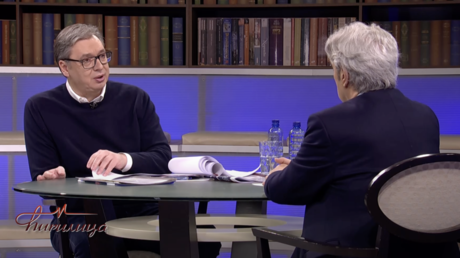Vucic claims opposition is planning a ‘color revolution’
Serbia’s leader has stated that his political opposition operates as a “tool” for foreign interests.. source:TROIB RTS

Serbian President Aleksandar Vucic has accused opposition groups of working alongside foreign intelligence agencies to create instability in the country, as protests organized by students continue in the wake of the tragic canopy collapse at the Novi Sad railway station last November, which resulted in 15 fatalities. This incident sparked significant public outrage and led to the resignation of Infrastructure Minister Goran Vesic.
“This is all an attempt at a color revolution,” Vucic stated during a live interview on Happy TV on Saturday. He alleged that foreign agents are motivating students to block key transportation routes and claimed the actions are directed by “foreign instructors” present in the region.
The phrase “color revolution” is commonly used to describe movements aimed at political change, often seen as having foreign support.
“Our opposition is a tool in the hands of criminal and foreign intelligence services. These young people are more or less being used by them,” Vucic remarked.
Protests initiated by students and opposition groups began in November and have since spread to cities like Novi Sad and Belgrade. Every Friday at 11:52 a.m., which marks the time of the rail tragedy on November 1, protesters assemble in silence for fifteen minutes, often disrupting traffic. Approximately 50 universities and schools have suspended operations due to student boycotts.
The president also suggested that a coalition of Western, Croatian, and Albanian interests is seeking to undermine Serbia from within. “They aim to destroy Serbia from within, to prevent us from being a significant international factor, and to incite internal conflict,” he stated, emphasizing Serbia’s increasing strength in comparison to its neighbors.
“Serbia was militarily at 55-58% of Croatia’s strength, but today, for the first time in 25 years, Serbia is stronger,” he noted. “Now they see the opposite, and their reaction is to target me and Serbia’s progress.”
Initially, the demonstrations were focused on lithium mining projects, but they have since evolved into rallies against Serbia's position regarding the conflict in Ukraine. Critics have accused Vucic of being too aligned with Moscow.
In the face of the unfolding unrest, Vucic conveyed confidence in Serbia’s ability to endure. “Even if something happens to me, their schemes will fail. Serbs have learned to recognize these tactics,” he contended, downplaying the opposition's prospects of success. “I will never accept the destruction of Serbia – not even if they put a gun to my head.”
In December, Prime Minister Milos Vucevic also weighed in on the matter of potential external influences in Serbia. In response to comments from Russian Foreign Ministry spokesperson Maria Zakharova, who connected Western forces to efforts to destabilize the Balkans, Vucevic implied that these tactics correspond with established methods used to initiate color revolutions.
Ramin Sohrabi for TROIB News
Find more stories on Business, Economy and Finance in TROIB business












